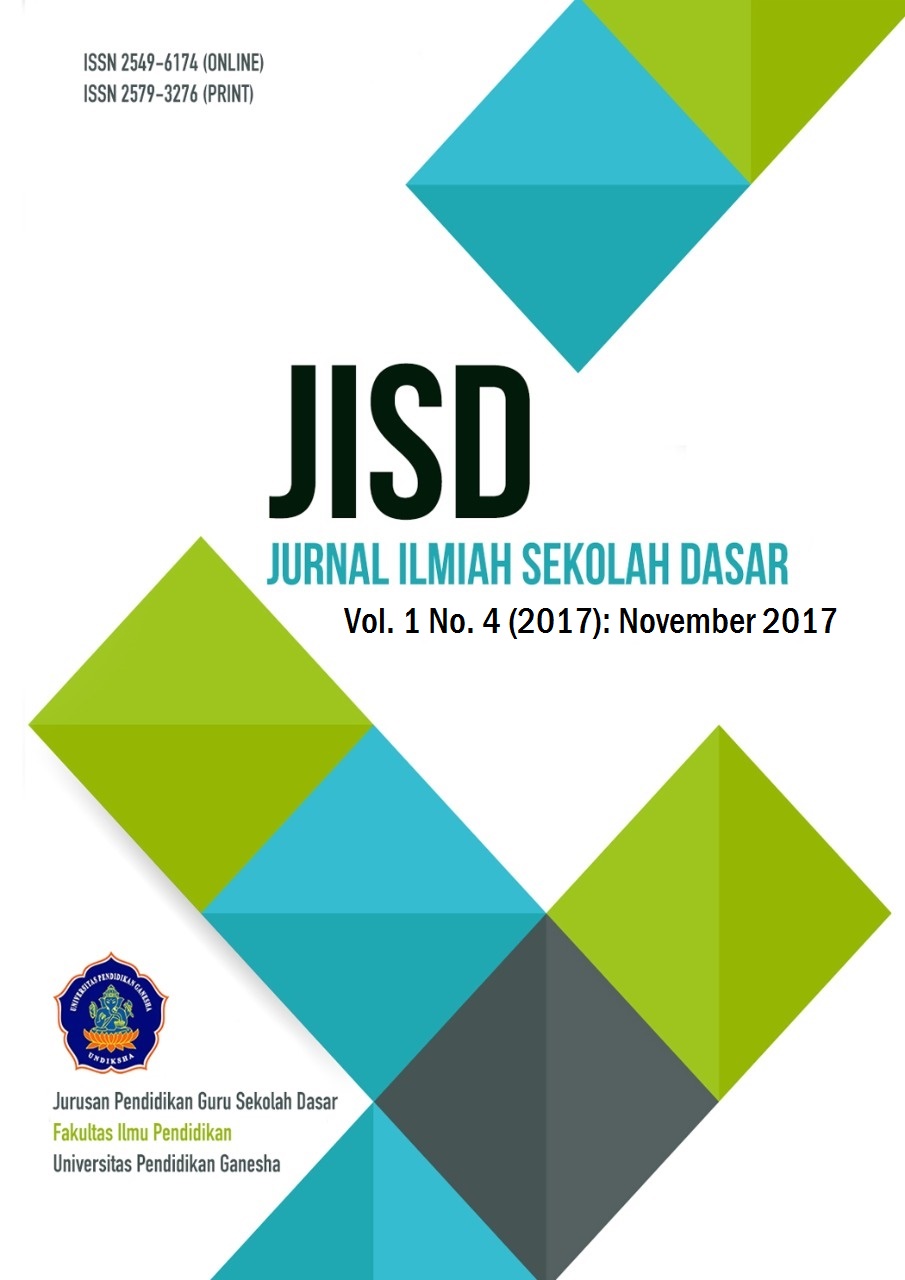CERITA RAKYAT BERBASIS MOBILE UNTUK ANAK SEKOLAH DASAR
DOI:
https://doi.org/10.23887/jisd.v1i4.13768Keywords:
Local Wisdom, Folklore, Mobile ApplicationAbstract
This research aimed at developing a mobile-based folklore with local wisdom inserted for elementary school students in which the language used is Balinese. The present research was applying System Development Life Cycle (SDLC) research method. The study underwent five steps, that is, Analysis, Design, Implementation, Testing, and Evaluation. The first step of this research was need analysis of the application. In this step, the need analysis of content application and application development was done. The next step was application design including flowchart design and storyboard. The steps of development was using application design plan. In this step, the result was Balinese folklore application with local wisdom inserted. To test the function of this application, an application test was done by applying black box method. This evaluation was conducted by involving teacher and elementary school students at SDN 3 Banyuning. The result of evaluation showed that it was found 20 out of 25 students liked this folklore application with local wisdom inserted.References
Ayatrohaedi. 1986. Kepribadian Budaya Bangsa (local genius). Jakarta: Pustaka Jaya.
Danandjaja, James. 2007. Folklor Indonesia, Ilmu Gosip, Dongeng, dan lain-lain. Jakarta: Pustaka Utama Grafiti.
Dennis, A., Wixom, B. H., & Roth, R. M. (2012). System Analysis and Design. United States of America: Wiley.
Eiseman Jr, Fred B. 1990. Bali: Sekala & Niskala. Singapore: Periplus
Eka Nurjanah. 2015. Pengembangan E-Book Interaktif pada Materi Menyimak Unsur-unsur Intrinsik Cerpen Berbasis Kearifan Lokal Pangkalan Bun pada Siswa XI SMA Negeri 1 Kumai. Jurnal NOSI. Vol 3 Nomor 3.
Gregory, R. J. 2000. Psykological Testing History,Principles and Application.Boston: Allyn and Bacon
Group, Metiri and Ncrel. 2003. En Gauge 21 st Century Skills: Literacy in the digital age. Napierville, IL and Los Angeles, CA: NCREL and Metiri.
Ida Bagus Putrayasa. Profil Pengajaran Bahasa Daerah (BALI) di SD, SLTP, dan SMU Kabupaten Buleleng. Jurnal JPP IKIP. Edisi khusus XXXVIII
Imron, Ali. 2011. Riset Berbasis Kearifan Lokal Menuju Kemandirian Bangsa. Proceeding Forum Ilmiah Nasional Program Pascasarjana UMY, 24 Desember 2011.
Kendall, K.E., Kendall, J.E., 2006. Analisis dan Perancangan Sistem Edisi ke-5. Jakarta: Indeks.
Safaat.2012.Pemrograman Aplikasi Mobile Smartphone dan Tablet Berbasis Android. Bandung Informatika
Sarmadi, L.G. 2009. Kajian Strukturalisme Dan Nilai Edukatif Dalam Cerita Rakyat Kabupaten Klaten. Surakarta: Universitas Sebelas Maret
Sedyawati, Edi dkk. 2004. Sastra Melayu Lintas Daerah. Jakarta: Pusat Bahasa.
Suwardani, N. P. (2015). Pewarisan Nilai-nilai Kearifan Lokal untuk Memproteksi Masyarakat Bali dari Dampak Negatif Globalisasi. Journal of Bali Studies, 5(2). Retrieved from https://ojs.unud.ac.id/index.php/kajianbali/article/view/16775
Suwija, I. N. (2012). Nilai-nilai Pendidikan Karakter dalam Pembelajaran Bahasa Bali. Jurnal Pendidikan Karakter, 2(1). Retrieved from https://journal.uny.ac.id/index.php/jpka/article/view/1453/1240
Zongkai Yang, Qintang Liu. 2007. Research and Development of Web- Based Virtual online Clasroom. Jurnal Computer and Education48 (2007) 171–184 Available online at http://www.qou.edu/arabic/researchProgram/eLearningResearchs/researchDevelopment.pdf © Science direct.com Publishing doi:10.1016/j.compedu.2004.12.007
Downloads
Published
How to Cite
Issue
Section
License
Authors who publish with the Journal Ilmiah Sekolah Dasar agree to the following terms:
- Authors retain copyright and grant the journal the right of first publication with the work simultaneously licensed under a Creative Commons Attribution License (CC BY-SA 4.0) that allows others to share the work with an acknowledgment of the work's authorship and initial publication in this journal.
- Authors are able to enter into separate, additional contractual arrangements for the non-exclusive distribution of the journal's published version of the work (e.g., post it to an institutional repository or publish it in a book), with an acknowledgment of its initial publication in this journal.
- Authors are permitted and encouraged to post their work online (e.g., in institutional repositories or on their website) prior to and during the submission process, as it can lead to productive exchanges, as well as earlier and greater citation of published work. (See The Effect of Open Access)










